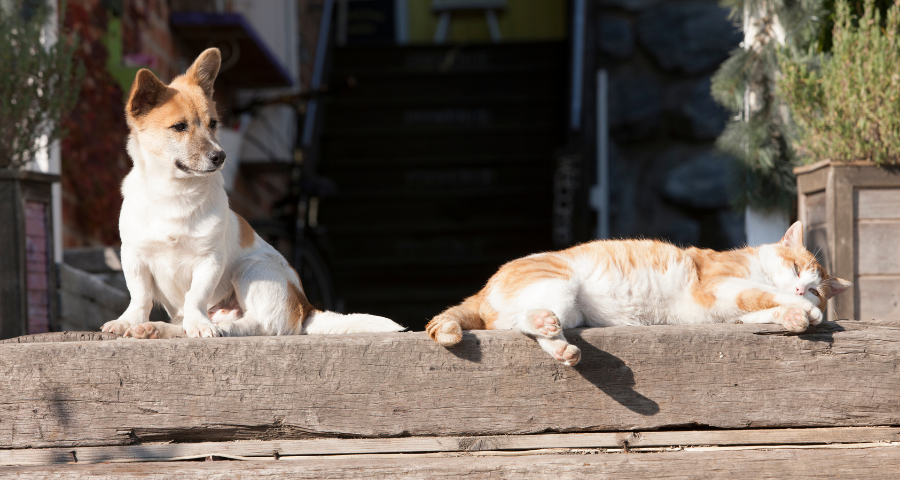
Warm weather hazards
We all love spending time outdoors on these long summer days, and our pets are no exception! The increased activity is great for their mental and physical health. To prevent some common warm-weather hazards from raining on your pet’s parade, follow these summer safety tips!
Heat stress
In hot weather, cats and dogs can be at risk of dangerous overheating. This can lead to heatstroke, a potentially fatal condition where your pet goes into a cardiovascular shock state, putting them at risk of brain, kidney, liver or heart damage.
Certain pets may be at more risk of overheating, due to reduced ability to cool themselves naturally. These include snub-nosed pets, pets with thick coats, overweight animals and animals with pre-existing respiratory issues.
To protect your pet from overheating in hot weather:
- Ensure they always have access to shade and cool water.
- Only exercise your pet in the cooler early morning and evening, and keep exercise light.
- Stop exercising your pet if they are panting heavily.
- Never leave your pet in a car unless the air-conditioning is running and they have adult supervision.
- On hot (over 28°C) or very humid days, keep your pet indoors with a fan or air-conditioning (especially important for at-risk pets).
Water safety
If you’re bringing your dog along for some fun water activities, it’s important to follow basic water safety guidelines as you would for a young child. Make sure your pet can only access pools under adult supervision. Not every dog is automatically a competent swimmer, so if your dog doesn’t have prior water experience, fit them with a dog life jacket, and introduce them to the water slowly. And remember, swimming is hard work! Help your dog out of the water promptly for a rest if they seem tired or are panting heavily.
Sun safety
Pets can get sunburnt just like us, particularly those with areas of pink skin on their noses, ears or bellies. Repeated sun damage can lead to nasty skin cancers, so regular protection against sunburn is best. In summer, prevent at-risk pets from sunbathing between 9:30 am – 4:00 pm. If they’re going to be outside during these hours, regularly apply a pet-safe sunscreen.
Grass seeds
From spring to summer, the grasslands in suburban and rural areas produce copious amounts of grass seeds. Some of these seeds are very sharp with backwards-facing barbs, which can get caught in your pet’s fur and embed painfully into their eyes, ears, paws or skin. From there, the seeds can migrate surprisingly deeply and cause infection. Pets may require surgical removal of seeds under anaesthetic, and sometimes in rare occasions with specialist CT or MRI to ascertain the location of particularly deep seeds. (including ones that migrate into the abdomen and brain!)
Help prevent issues by keeping your pet well-groomed during spring and summer, with weekly brushing to remove excess undercoat, and trimmed fur around their face, ears and paws.
Provided your pet safely avoids these warm weather hazards, we’re sure they’re going to love joining their favourite person (you!) for some fun summertime activities.



